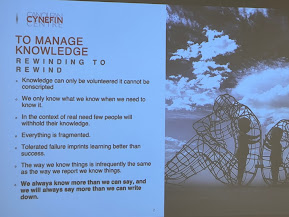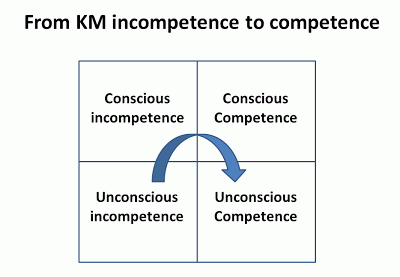Going Back to Dave Snowden’s Seven KM Principles
1. Knowledge can only be volunteered, it cannot be
conscripted
The sharing
of knowledge is inherently a human behavior. Yet it only happens when we are
intrinsically invested in the positive impact that the sharing of our knowledge
has on the receiving end (because we want to help, because we get nice
feedback, because we want to build relationship, because it might help
ourselves in the future, etc.). If we are told by someone else that we must share
a particular knowledge, there is automatically a loss of quality, because we
have no actual stake in the outcome of the knowledge sharing process. So the
piece of knowledge that is shared is of lower quality, which inevitably leads
to lower adoption and ultimately to lower impact (or no impact at all). This is
maybe the most important KM principle of all, yet organizations unfortunately
ignore it all the time when they create mandatory knowledge transfer processes,
databases of lessons learned or force individuals into regulated knowledge exchange
formats and groups. Instead, we must work with the intrinsic motivation of
people to be of help to others, to achieve impact, to get acknowledged as
experts, get elevated in their status or be rewarded for the good work they do.
2. We only know what we know when we need to know
it.
The effort
to document every bit of knowledge in advance is a huge waste of resources. The
reason is that it is impossible to know ahead of time which parts of all our
potential knowledge will be actually useful to someone else in a specific
situation. “With high abstraction and
high codification, you get rapid diffusion, yet the knowledge remains
superficial. With low abstraction and low codification, diffusion becomes
difficult, but the knowledge is actually denser.” And whether we can afford
to go the path of low abstraction depends on the context one is in. In a
specialized group with experts in a topic, another expert can convey more deep
knowledge in 2 min than what he could communicate in 6 min to a laymen’s group,
because there is a common reference based and a common knowledge around the
topic. That’s why silos exist in the first place. Because it is more economic (in
terms of effort) to focus on knowledge transfer just within silos. One way then
to handle knowledge transfer across silos then is either through metatdata (so
people can find things without having to know the professional lingo). The
other way is to foster the emergence of informal communities, which leads us to
the next principle.
3. In the context of real need few people will
withhold their knowledge.
Which is
why we have to be careful in formalizing and putting mandatory elements around
communities. We don’t create healthy communities by building formal
constructs in which networking must happen in this or that way. We must
stimulate the formation of informal communities, and those
informal communities which stabilize we then re-enforce so they can thrive. So we
shouldn’t create a predefined set of Community of Practice from scratch,
because the energy cost to do so is massive. We instead stimulate the
environment to see what gets traction and then we enforce and put boundaries in
place and invest more energy in to it in order give them the institutional
support they need.
4. Everything is fragmented.
One of the
reasons social media works is because it is fragmented. People like to share
anecdotes and snippets. “The human brain
evolved to handle fragments and put them together, not to process structured
information.” This is how we humans share knowledge, at the fire place, at
the dinner table, at the coffee machine. And “a cluster of such anecdotes is more valuable than a structured
document”. We must keep this in mind when we encounter tendencies to overly
rely on explicit knowledge encoded in formal documents. Formal documents, while
not without merit in specific situations, are not what is best suited to
diffuse knowledge. We think and communicate primarily in fragmented anecdotes
and snippets, so we need to foster environments where such knowledge fragments
can live and promulgate.
5. Tolerated failure imprints learning better than
success.
“All the stories we tell children as learning
stories around the world are stories of failure, not success.” It’s never ‘Hansel and Gretel had a
plan, went into the woods and know how to get out of it.’ No, its ‘Hansel and
Gretel got lost in the woods and imprisoned by the witch, and had to learn on
the fly how to rectify their mistake.’ The human brain picks up failure faster
than success, because avoidance of failure is a more successful strategy than
the imitation of success. We should build worst practices, not best practices
(which might include fictional stories as well as real-life stories). The principle of loss aversion
popularized by David Kahneman
shows us that humans are biased to value the avoidance of pain multiple times higher
than the prospect of gain. We have to work with that bias in KM as well.
6. The way we know things is rarely the same as
the way we report we know things
We should capture
learning as the learning happens, because a few hours later, we remember the
learning already differently. “If we do a
project retrospective, people who fail in a project will remember the past
completely differently than people who succeed in a project. We adjust our
memory to conform with the reality of the present”. That is important to
know, because so much in KM relies on retroactive reporting, which is almost
certainly wrong and will not repeat itself in the same way. The answer to this
is again the fostering of informal communities, in which experiences can be
talked about and are reflected upon in real-time.
7. We always know more than we can say, and we can
always say more than we can write down.
There is always
a great loss of content and a loss of context when transferring knowledge. It
is much easier to capture a narrative and re-use a narrative e.g. in a best
practice document than to improvise solutions when the situation and context
changes. That doesn’t mean that best (or good) practice documents can’t be
helpful in certain situations. But we must not delude ourselves into thinking this
is the essence of knowledge. The essence most likely got lost along the way,
and we need to find complementary formats and channels through which the
essence of our experiences is shared. This is again a warning of the
overreliance on encoded knowledge in documents.
I always find it helpful to re-phrase and document (ha, the irony!) such pointers for me once in a while, so I can go back to them again and again to remind myself of what not to lose sight of. No matter where we are in our professional journey, it is always useful to hone the basics, lest we get overconfident and complacent. I hope it is helpful to you too.




Comments